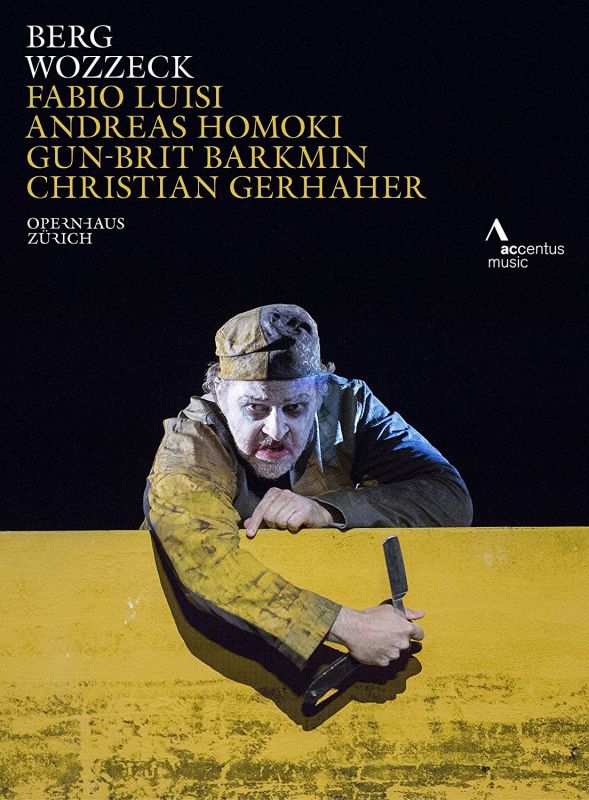BERG Wozzeck
View record and artist detailsRecord and Artist Details
Composer or Director: Alban Berg
Genre:
Opera
Label: Accentus
Magazine Review Date: 11/2016
Media Format: Digital Versatile Disc
Media Runtime: 101
Mastering:
DDD
Catalogue Number: ACC20363

Tracks:
| Composition | Artist Credit |
|---|---|
| Wozzeck |
Alban Berg, Composer
Alban Berg, Composer Brandon Jovanovich, Drum Major, Tenor Christian Gerhaher, Wozzeck, Baritone Fabio Luisi, Conductor Gun-Brit Barkmin, Marie, Soprano Lars Woldt, Doctor, Bass Mauro Peter, Andres, Tenor Wolfgang Ablinger-Sperrhacke, Captain, Tenor Zurich Opera House Chorus Zurich Philharmonia |
Author: Neil Fisher
Wozzeck sees red: the red moon; a bloody knife; flames in the sky. Zurich Opera’s production, directed by Andreas Homoki, is washed in radiation-yellow, a sickly glow evoked by lighting designer Franck Evin that might look painterly were it not such a chemical shade of jaundice. It picks out where real cheeks, chins and noses meet the cracked, heavy white facepaint on the characters’ faces. Caught in close-up by Michael Beyer’s sensitive video direction, perhaps you glimpse more human reaction than Homoki really wants you to see.
Büchner’s drama, Woyzeck, was written in the 1830s but reclaimed by expressionists in the 20th century. Homoki offers a synthesis between the two worlds. A puppet theatre – the costumes and wigs say English seaside more than central European marionettes – is conjured up through Michael Levine’s ingenious set: concentric wooden frames from which characters can appear and disappear as if manipulated by giant unseen hands. As the world slides away from Wozzeck – ‘it’s an abyss, I feel dizzy’, the soldier complains – so even this precarious perspective crumbles. It’s also a reminder that, just as the set can be shuffled, so can the drama itself, because Büchner’s scrambled collection of scenes had no obvious order.
This is a finely honed production that follows its premise to an absurdist conclusion with slick theatricality and dispassionate zeal. The children in the final scene are all sinister doll-like versions of the adult characters. They include a pint-size, preening Captain (with tricorn) and the Drum Major, whose own plus-size headgear is set off by a tumescent plume. Marie (Gun-Brit Barkmin) is a wide-eyed Victorian strumpet with scarlet rag-doll hair; her and Wozzeck’s child is a true puppet, blank eyes in its wooden head.
All sentimentalism is banished here. So, largely, is the opera’s plea for justice and compassion. It is left to Christian Gerhaher’s Wozzeck to fight that battle, which he does with formidable diction and great lyrical beauty, offering, where he can, a still centre in the tumult. Perhaps the baritone has come to the role a shade too late; there’s a world-weariness here that suggests this soldier had long since given up the fight. Barkmin shines, at least vocally, with a bright jugendlich-dramatischer sound that she stretches to raw, raddled contrition as the screw turns.
Brandon Jovanovich’s muscular tenor gives (sorry) real thrust to his priapic Drum Major, and Wolfgang Ablinger-Sperrhacke’s Captain sings with silky venom. The dramatic chiaroscuro comes from the orchestra. Fabio Luisi’s incisive conducting slices artfully between Berg’s fatty cuts of late Romanticism (I’m sure I’ve never heard Baron Ochs join the waltz at the Heuriger tavern) and his queasy dissonances and eerie number-games. The orchestra, rapier-sharp and cutting to the quick, offer much more than Swiss precision.
Discover the world's largest classical music catalogue with Presto Music.

Gramophone Digital Club
- Digital Edition
- Digital Archive
- Reviews Database
- Full website access
From £8.75 / month
Subscribe
Gramophone Full Club
- Print Edition
- Digital Edition
- Digital Archive
- Reviews Database
- Full website access
From £11.00 / month
Subscribe
If you are a library, university or other organisation that would be interested in an institutional subscription to Gramophone please click here for further information.




